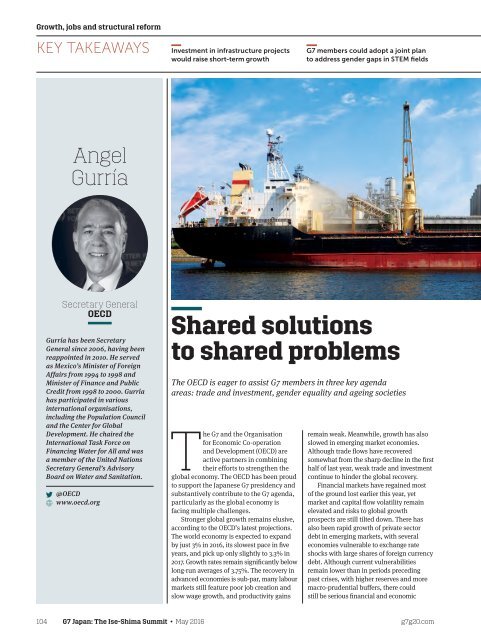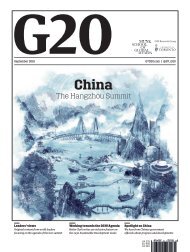G7_JAPAN
You also want an ePaper? Increase the reach of your titles
YUMPU automatically turns print PDFs into web optimized ePapers that Google loves.
Growth, jobs and structural reform<br />
KEY TAKEAWAYS<br />
Investment in infrastructure projects<br />
would raise short-term growth<br />
<strong>G7</strong> members could adopt a joint plan<br />
to address gender gaps in STEM fields<br />
Angel<br />
Gurría<br />
Secretary General<br />
OECD<br />
Gurría has been Secretary<br />
General since 2006, having been<br />
reappointed in 2010. He served<br />
as Mexico’s Minister of Foreign<br />
Affairs from 1994 to 1998 and<br />
Minister of Finance and Public<br />
Credit from 1998 to 2000. Gurría<br />
has participated in various<br />
international organisations,<br />
including the Population Council<br />
and the Center for Global<br />
Development. He chaired the<br />
International Task Force on<br />
Financing Water for All and was<br />
a member of the United Nations<br />
Secretary General’s Advisory<br />
Board on Water and Sanitation.<br />
@OECD<br />
www.oecd.org<br />
Shared solutions<br />
to shared problems<br />
The OECD is eager to assist <strong>G7</strong> members in three key agenda<br />
areas: trade and investment, gender equality and ageing societies<br />
The <strong>G7</strong> and the Organisation<br />
for Economic Co-operation<br />
and Development (OECD) are<br />
active partners in combining<br />
their efforts to strengthen the<br />
global economy. The OECD has been proud<br />
to support the Japanese <strong>G7</strong> presidency and<br />
substantively contribute to the <strong>G7</strong> agenda,<br />
particularly as the global economy is<br />
facing multiple challenges.<br />
Stronger global growth remains elusive,<br />
according to the OECD’s latest projections.<br />
The world economy is expected to expand<br />
by just 3% in 2016, its slowest pace in five<br />
years, and pick up only slightly to 3.3% in<br />
2017. Growth rates remain significantly below<br />
long-run averages of 3.75%. The recovery in<br />
advanced economies is sub-par, many labour<br />
markets still feature poor job creation and<br />
slow wage growth, and productivity gains<br />
remain weak. Meanwhile, growth has also<br />
slowed in emerging market economies.<br />
Although trade flows have recovered<br />
somewhat from the sharp decline in the first<br />
half of last year, weak trade and investment<br />
continue to hinder the global recovery.<br />
Financial markets have regained most<br />
of the ground lost earlier this year, yet<br />
market and capital flow volatility remain<br />
elevated and risks to global growth<br />
prospects are still tilted down. There has<br />
also been rapid growth of private sector<br />
debt in emerging markets, with several<br />
economies vulnerable to exchange rate<br />
shocks with large shares of foreign currency<br />
debt. Although current vulnerabilities<br />
remain lower than in periods preceding<br />
past crises, with higher reserves and more<br />
macro-prudential buffers, there could<br />
still be serious financial and economic<br />
104 <strong>G7</strong> Japan: The Ise-Shima Summit • May 2016 g7g20.com
















